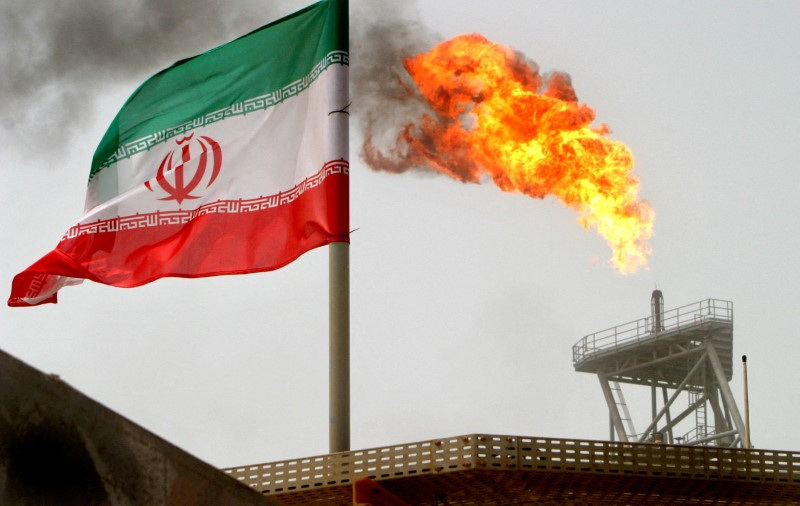By Muyu Xu
(Reuters) - China's oil imports from Iran have hit record highs as Iran ramps up output despite the threat of further U.S. sanctions.
Existing sanctions were implemented over Iran's nuclear programme, and U.S. lawmakers are seeking to exert further pressure after the Oct. 7 attacks on Israel by Hamas, which has long been backed by Iran, although Tehran has denied any involvement.
U.S. lawmakers are now considering legislation that could impose measures on foreign ports and refineries that process petroleum exported from Iran.
Here are key facts on Iran's oil trade with China:
HOW MUCH IRANIAN OIL IS CHINA BUYING?
China, the world's largest crude importer and Iran's top customer, bought an average 1.05 million barrels per day (bpd) of Iranian oil in the first 10 months of 2023, according to shiptracking data from Vortexa. This is 60% above pre-sanction peaks recorded by Chinese customs in 2017.
Imports jumped this year after Tehran raised output and offered steep discounts.
Tehran's October output edged up to 3.17 million bpd, a Reuters survey found, the highest since 2018, when Washington re-imposed sanctions on Iran, according to Reuters surveys and OPEC figures.
China's October imports from Iran are estimated to have reached around 1.45 million bpd, the highest monthly level ever, Vortexa data showed.
HOW DOES IRANIAN OIL ENTER CHINA?
Except for two cargoes in December 2021 and January 2022, China's customs has not recorded any direct imports from Iran since December 2020.
Almost all Iranian oil entering China is branded as originating from Malaysia or other Middle Eastern countries.
The oil is carried by a "dark fleet" of older tankers that typically switch off their transponders when loading at Iranian ports to avoid detection.
Other tactics used by such ships include faking locations and conducting ship-to-ship (STS) operations at locations outside of authorised transfer zones and sometimes in poor weather to conceal activities, raising fears among nations over potential pollution.
These ships sometimes become traceable via satellites near ports in Oman, the UAE and most prominently Malaysia, a top trans-shipment hub, before discharging cargoes mostly at ports in China's Shandong province, according to Vortexa and Kpler.
China regulates crude oil imports by issuing quotas. Earlier this year when quotas were tight, traders labelled a few Iranian heavy crude shipments as bitumen mix, prompting Chinese authorities to step up tanker inspections.
WHICH CHINESE REFINERIES BUY IRANIAN CRUDE?
Giant state refiners Sinopec (OTC:SHIIY) and PetroChina were once key Iranian oil clients, with investments in oilfields in the country. But they have stopped lifting Iranian oil since late 2019, after then-U.S. President Donald Trump re-imposed sanctions on Tehran's petroleum exports.
The sanctions initially led to a sharp drop in flows to China, but volumes have rebounded as more independent refiners joined the purchases.
Most of the more than 40 independent Chinese refiners, known as teapots, process Iranian oil, according to Chinese traders. Teapots have little exposure to the dollar-based global financial system and don't need to cooperate with western firms on technology. Most of the transactions are believed to be paid in Chinese currency.
WHY DO INDEPENDENT REFINERIES FAVOUR IRANIAN OIL?
Mainly because the oil is cheap and of good quality.
Iranian Light, the main export grade, trades at a discount of about $13 a barrel to ICE Brent on a deliver-ex-ship basis in Shandong for December arrival. That compares with a premium of about $5 a barrel for similar-quality Oman crude.
WHAT'S BEIJING'S STANCE ON THE TRADE?
China also buys crude from Russia and Venezuela - which have also faced U.S. sanctions. Beijing has long opposed unilateral sanctions and has said its normal trade deserves respect and protection.
However, China's last Iranian oil cargo officially recorded by customs was in early 2022, destined for state reserves.
WHAT ENFORCEMENT ACTION HAS THE U.S. GOVERNMENT TAKEN?
Since 2021, Washington has sanctioned over 180 individuals and entities related to Iran's petroleum and petrochemical sectors or related to moving and laundering illicit proceeds.
Over 40 vessels have been identified as blocked property of the sanctioned entities.
The U.S. government also regularly engages with other countries to strongly discourage them from taking steps that contravene sanctions on Iran, the State Department told Reuters in October.
